1936:
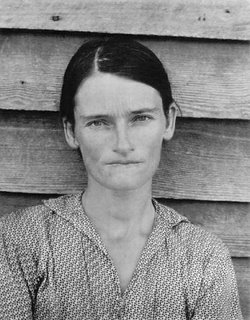
Bing Crosby (with Jimmy Dorsey's Orchestra), I'm an Old Cowhand.
Bill "Jazz" Gillum, I Want You By My Side.
Bill Boyd, River Blues.
Adelaide Hall, I'm in the Mood For Love.
Memphis Minnie, Man You Won't Give Me No Money.
King Radio, Unfortunate Bridegroom.
Jesse James, Southern Casey Jones.
Benny Goodman Quartet, Dinah.
Don Albert Orchestra, Liza.
Béla Bartók, Music for Strings, Percussion and Celesta: Allegro Molto.
Django Reinhardt and Le Quintette du Hot Club de France, Shine.
Blue Sky Boys, I'm Here to Get My Baby Out of Jail.
Blind Roosevelt Graves, I'll Be Rested (When the Roll is Called).
War is now inevitable, and it will be the most terrible war there has ever been. I don't think I shall see it, but you will. Wait now for bombs on this little house.
Ralph Wigram, to his wife Ava Bodley, after Hitler's occupation of the Rhineland in March 1936. Wigram would die that December, and his house would indeed be destroyed during the war.
While the 1930s is one of the grimmer decades in terms of life and happiness in the 20th Century, it's also my favorite decade for music and films, a wonderfully fecund period. So that's why, while I had originally intended in this series to only offer about six or seven songs per decade, I went overboard with this one. You understand.
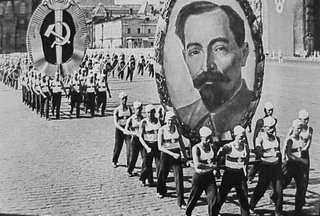
"I'm an Old Cowhand," Bing Crosby's rendition of Johnny Mercer's Western lampoon, is for me one of the gonzo masterpieces of 20th Century American humor, akin to Duck Soup, Blazing Saddles, Duck Amuck, 1950s Mad magazine, Buster Keaton's Cops, the courtroom sequence in Bananas, and the "monorail" episode of The Simpsons. It was Mercer's first composition to be a real hit, and the first of many Mercer tunes that Crosby would record ("Cowhand" was written for the Crosby film Rhythm on the Range, in which Crosby starred with the doomed Frances Farmer).
Though the track's not even three minutes long, there's a universe packed inside it--Bing gets the first two verses, Jimmy Dorsey's band swings through one, and then the chorus, a bunch of slickers pretending they're the Sons of the Pioneers, takes another. Bing trades some jibes, then croons while the band goes stop-time on him, Dorsey sneaks in for a sweet eight-bar clarinet solo, and after Bing has his last word, it all collapses into a freakish hoedown. There's even lots of cowbell, for heaven's sake.
Recorded in Los Angeles on July 17, 1936. Find on Too Marvelous for Words.
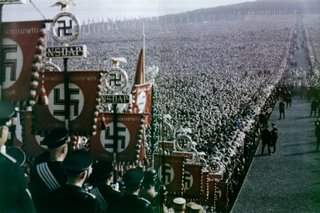
Nuremberg, 1936: "the responsibility of the individual replaced the irresponsibility of the masses"
We cannot look back with much pleasure on our foreign policy in the last five years. They certainly have been disastrous years...we have seen the most depressing and alarming change in the outlook of mankind which has ever taken place in so short a period. Five years ago, all felt safe; five years ago, all were looking forward to peace...Five years ago to talk of war would have been regarded not only as a folly and a crime, but almost a sign of lunacy.
Winston Churchill, speech to Parliament, 26 March 1936.
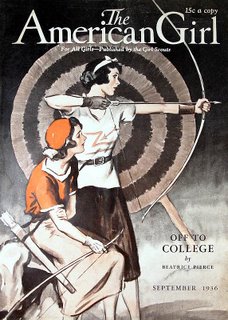
armed for college
Bill "Jazz" Gillum, born in 1904 in Indianola, Mississippi, was a Chicago blues musician whose past reputation as a middling journeyman is undeserved. Like many of his generation, Gillum left Mississippi in the '20s and headed up to Chicago to find work and relative freedom. By 1934, he was recording regularly for RCA Victor's Bluebird label.
"I Want You By My Side," which freely poaches the melody of W.C. Handy's "Careless Love," is a good example of Gillum's style, marked by his wheezing harmonica and his confident, sly singing. Recorded in Chicago on April 4, 1936, with Ransom Knowling on bass and his friend Bill Broonzy on guitar. On The Essential.
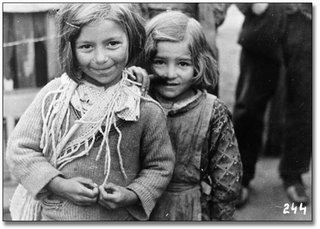
Children of the Spanish Civil War
Bill Boyd, along with Bob Wills and Milton Brown, was one of the great architects of Western swing. Of the three, Boyd was the most traditional, his sound grounded in the style of a country string band as opposed to Wills' and Brown's jazzier inclinations. Boyd, born in 1914 in Texas, was a mere 18 years old when he formed the Cowboy Ramblers, in which he played guitar, sang and led the band. By the late '30s Boyd had become a radio star and was featured in several Western movies.
"River Blues" is a cover (or a ripoff) of "The River's Taking Care of Me," the latter best known as a 1933 Connee Boswell/Dorsey Brothers hit. Boyd's version, which slows down the beat and salts in some fiddle and steel, was recorded on February 24, 1936. On Saturday Night Rag.
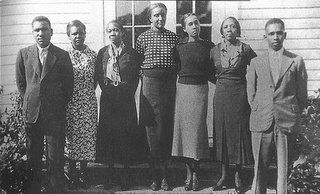
Adelaide Hall was one of the biggest African-American Broadway stars of the 1920s, starring in shows like Blackbirds of 1928. But like her contemporary Josephine Baker, Hall would find her greatest fame in Europe, where she began performing in the early 1930s. In 1938, Hall moved to London, where she would spend the rest of her life as one of Britain's most loved entertainers.
Her version of Jimmy McHugh and Dorothy Fields' "In the Mood for Love" is a showcase for Hall's refined, elegant singing. It was recorded on January 20, 1936. On A Centenary Celebration.
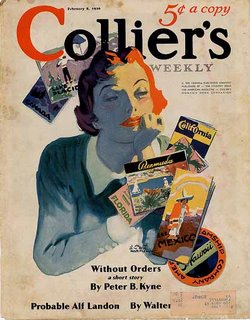
Memphis Minnie might be in the mood for love too, but right now she's just irritated at her skinflint lover. Born in Algiers, Louisiana in 1897, Minnie was a guitar prodigy, a circus perfomer, and, recording with her husband, Kansas Joe, a crafter of intense country blues. By 1936, however, she and Joe had separated, and Minnie was in Chicago, making tracks with a harder, more modern sound.
The fierce "Man You Won't Give Me No Money" features her third husband, Little Son Joe Lawler, on guitar as well. Recorded on May 27, 1936; find on Hot Stuff.
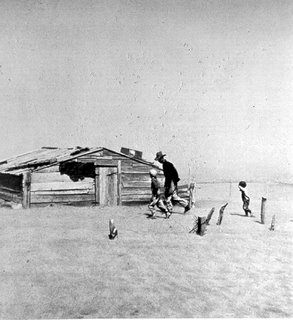
Rothstein, Farmer and Sons, Oklahoma.
Calypso, the island of Trinidad's musical export, is "the African diaspora's most logocentric genre" (Robert Christgau). A garrulous ancestor of hip hop, calypso is a music besotted with words, sometimes at the expense of melody and even danceable rhythms. As Christgau notes, this likely cost calypso its chance to be the Caribbean's most internationally prominent music, a title calypso ultimately conceded to reggae.
One of calypso's finest practitioners was Norman Span, better known as King Radio. Born in Port-of-Spain around the turn of the century, Radio was performing in calypso tents by the late 1920s, apparently first making his name with a calypso about Charles Lindbergh's flight. In 1936, along with a number of rival calypsonians, he traveled to New York to make some records.
"Unfortunate Bridegroom," recorded on April 9, 1936 with Gerald Clark and His Caribbean Serenaders, has a typical calypso lyric in that it details a byzantine, sex-filled local scandal--see also Sir Lancelot's "Scandal in the Family" from the following decade. Find on Roosevelt in Trinidad.
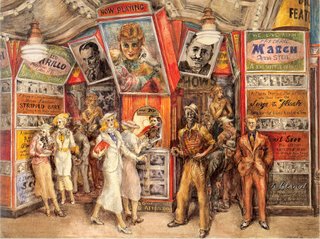
Marsh, Twenty Cent Movie.
One recent discovery for me is Jesse James' astonishing take on "Casey Jones." "Casey Jones," which musicians had performed in various incarnations since 1900, was as much a piece of history to James as it is to us; James transforms the song, most likely using Furry Lewis' 1928 side as a starting point, into an expression of power, a work of muscle and drive.
Recorded in Chicago on June 3, 1936. "Southern Casey Jones" is a bit hard to find on CD these days; you can try the out-of-print compilations Cincinnati Blues, or Harry Smith's Anthology of American Folk Music, Volume Four.

Hopper, The Circle Theatre.
Will try to give you the information you request. I do not think that there is any section in the state of Arkansas that the negro would be discriminated against as long as he knows his place and most of our southern negroes do. However, the negroes from the north and east are not familiar with the conditions and laws in the south, especially in Arkansas, and would possibly have a right to feel that they are being discriminated against. For reason they are not allowed certain privileges of the white people. Namely, eating at the same table, rooms at the same hotel, riding in the same sections on trains...
There is no feeling against the colored race as far as his being a tourist is concerned. He has the same road protection that any other person would have.
Marion Dickens, president of the Newport, Arkansas, Chamber of Commerce, letter of 6 July 1936, in response to the Federal Writers' Project, which had asked local communities what sort of conveniences were available for black travelers.
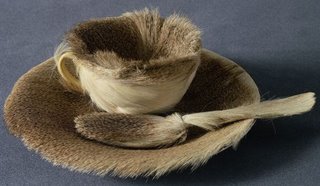
Oppenheim, Luncheon in Fur.
In a series of concerts in 1935, Benny Goodman made swing the most popular music in the country. Goodman's big band became the face of swing for the rest of the decade, led by Goodman's distinctive clarinet playing, and (sometimes overlooked) the arrangements of the bandleader Fletcher Henderson, who began working for Goodman after his own big band collapsed in 1934. An equivalent to the latter situation would be if the Rolling Stones had hired Chuck Berry as their songwriter and rhythm guitarist.
But it is in Goodman's small groups, in particular his quartet (Teddy Wilson, piano, Lionel Hampton, vibes and Gene Krupa, drums) where you can find Goodman's purest art. The quartet was a marvel--players who knew each other's next move instinctively, and who crafted a brand of streamline moderne chamber music.
The quartet's take on the standard "Dinah" features Hampton's softshoe on vibes and a dazzler of a solo by Goodman. It was recorded on August 26, 1936; find on Legendary Small Groups.
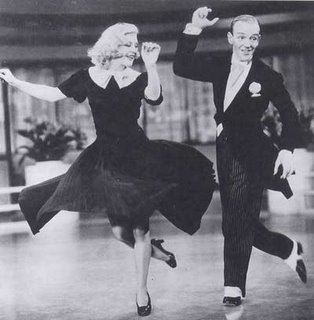
Swing Time
As Goodman was establishing himself as a national act, there were dozens upon dozens of "territory" jazz bands delivering swing music around the country. While these acts may have lacked the finesse of the top swing orchestras, the territory bands made up for it with enthusiasm, rawness, and most importantly, proximity.
The trumpeter Don Albert led one such band, based out of San Antonio, which covered much of the Southwest (though their travels apparently led them East, and up into Canada as well). Albert, a Creole, was born Albert Dominique in New Orleans. In 1926, he moved to Texas and began assembling a band, which hit the road at the end of the decade. While the Albert band toured throughout the 1930s, it only recorded eight tracks, one of which is "Liza," Albert's version of a Gershwin tune originally dashed out for the 1929 musical Show Girl. It's a fine bit of swing, highlighted by Billy Douglas' hot trumpet solo. Recorded at the Bluebonnet Hotel in San Antonio, on November 18, 1936.
The Albert Orchestra tracks have never been released on CD, but, in a nice turn of fortune, you can hear them all on this site; read about Albert's life in Jazz on the Road.
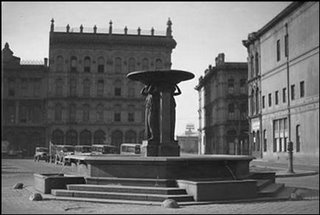
So last week, the board of directors of Selznick Pictures, Inc., had a conference. The four members of the board sat around a costly table in an enormously furnished room, and each was supplied with a pad of scratch paper and pencil. After the conference was over, a healthily curious young employee of the company went in to look at those scratch pads.
He found:
Mr. David Selznick had drawn a seven-pointed star, below that, a six-pointed star, and below that again, a row of short vertical lines, like a little picket fence.
Dr. A.H. Giannini, the noted California banker, had written over and over, in a long, neat column, the word "tokas", which is Yiddish for "arse."
And Mr. Merian Cooper, the American authority on Technicolor, had printed, in the middle of his page, "RIN-TIN-TIN."
The result of the conference was the announcement that hereafter the company would produce twelve pictures a year, instead of six.
I don't know. I just thought you might like to be reassured that Hollywood does not change.
Dorothy Parker, 1936 letter to Gerald Murphy.
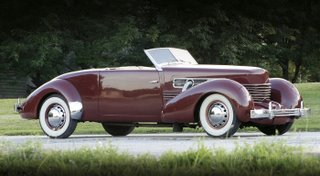
'36 Cord 810 Phaeton
Béla Bartók composed Music for Strings, Percussion and Celesta in Budapest during 1936, a year when Hungary, controlled by irredentists and fascist sympathizers, was aligning further with Nazi Germany, which would reward Hungary with bits of dismembered Czechoslovakia, Romania and Yugoslavia. Bartók eventually fled Hungary to the United States, where he composed his last great work, the Concerto for Orchestra, and where he died of leukemia in 1945.
"Music for Strings...", as its title indicates, is written for strings (violin, viola, cello, double basses and harp), percussion (xylophone, snare drum, cymbals, tam-tam, bass drum, timpani, and piano could also fall under here) and celesta. Here is the final movement, allegro molto, a sort of idealized folk dance in rondo form.
"Music For Strings..." was completed on September 7, 1936, and premiered in Basel, Switzerland, four months later. This performance is by Leopold Stokowski and his Symphony Orchestra, with Edwin Hymovitz on celesta; it's on the EMI Angel LP AE-34481, which has not made it to CD. However, you can find many other versions on disc, such as renditions by Karajan, Dutoit and Saraste.

Django Reinhardt, a gypsy born in Belgium and raised in France, became Europe's first great jazz player, a guitarist whose skills have never been equalled (Woody Allen's Sweet and Lowdown is a funny riff on the myth of Django). After surviving a gruesome burning that maimed him, Reinhardt taught himself to play guitar using only three fingers, as his two smallest fingers, permanently curled, could only help form chords.
He formed the Quintette du Hot Club de France in 1934, which consisted of Reinhardt, his longtime collaborator, the violinist Stephane Grappelli, his brother Joseph and Pierre Ferrel on guitars and Louis Vola on bass. In this version of "Shine", a track that Louis Armstrong, a major influence on Reinhardt, had made famous, the Quintet is joined by the singer Freddy Taylor. Reinhardt stayed in Paris during the war and, thanks in part to a Luftwaffe official who loved jazz, escaped the fate of most of his Gypsy relatives, who were slaughtered in concentration camps.
Recorded in Paris on October 15, 1936. Find on Classic Early Recordings.
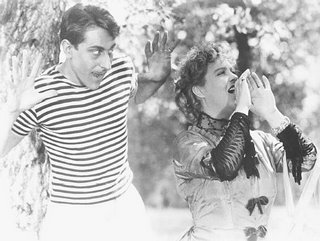
Renoir's Partie de Campagne
The Blue Sky Boys are an example of the "brother" acts that defined 1930s and 1940s country music. When William and Earl Bolick (born in East Hickory, North Carolina, in 1917 and 1919, respectively) decided to perform as a duo, they were told they needed to stand out from the various Monroes, Delmores, Carlisles, etc., that already dominated the market. So the brothers first decided to not bill themelves as such ("Blue Sky" refers to the Blue Ridge Mountains) and then concentrated on defining a new sound--marked by intricate, close harmonies and minimalist accompaniment. You can hear the Blue Sky Boys in the next generation of country musicians, especially the Louvin and Everly Brothers.
"I'm Here to Get My Baby Out of Jail" was written by Karl Davis, who performed in the duo Karl and Harty. It was one of the first tracks the Blue Sky Boys recorded for RCA Victor, on June 16, 1936. The only place you can find it on CD is on the extensive but costly box set The Sunny Side of Life.
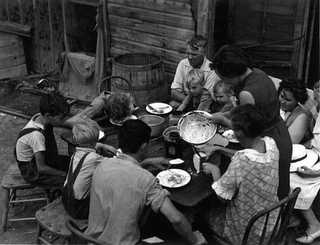
And, lastly, listen to Blind Roosevelt Graves. Graves, born in 1909, lived in Laurel, Mississippi, where he played with his brother Aaron (sometimes referred to as Uaroy) on street corners and at the occasional country fair. Roosevelt, who was born blind, played guitar and sang, while Aaron, who could use enough of one eye so that he could guide the pair around, played tambourine and sang. The Graves brothers also were in a group called the Mississippi Jook Band (which included Cooney Vaughan on piano), which recorded a few sides that sound like rock & roll, twenty years before it allegedly began. Graves and his brother vanish after the early '40s, with Roosevelt apparently dying at some point in the following decade.
"I'll Be Rested (When the Roll is Called)," a rolling, tumbling gospel blues, was recorded in Hattiesburg, Mississippi, on July 7, 1936. Find on Complete Recorded Works.
No comments:
Post a Comment